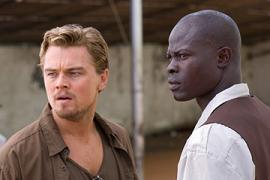 I liked “Blood Diamond” for a lot of little reasons and one big one. I liked it because Leonardo DiCaprio seemed more like a man’s man–or at least an adult–than he did as Howard Hughes in “The Aviator” or other adults he’s tried to play. I liked it because I like the inspiring and believable presence Djimon Hounsou has brought to the screen ever since “The Gladiator.” And I liked how Jennifer Connelly, as a white American in a world that was anything but, reminded me of how different so much of the world is. (I should always know it, but I forget.)
I liked “Blood Diamond” for a lot of little reasons and one big one. I liked it because Leonardo DiCaprio seemed more like a man’s man–or at least an adult–than he did as Howard Hughes in “The Aviator” or other adults he’s tried to play. I liked it because I like the inspiring and believable presence Djimon Hounsou has brought to the screen ever since “The Gladiator.” And I liked how Jennifer Connelly, as a white American in a world that was anything but, reminded me of how different so much of the world is. (I should always know it, but I forget.)
But more than any of those, I really like “Blood Diamond” because we too often live in a world where discussions are about which “side” we’re on, who’s “right,” the “either/or,” “right” or “left,” “Red” or “Blue.”
“Blood Diamond” is truly not about the “or” as much as it is about–in author Jim Collins’ words–the genius of the “and”:
- It is a socially consciousness movie and a dang good action movie.
- It’s relevant to current political situations and it’s a comprehensive moral tale about what individuals do when treasure (profit) may be involved.
- It’s ugly–almost revolting–in terms of its violence and hideous images, and it beautifully depicts Africa’s natural splendor.
- It’s about the characters–DiCaprio’s diamond smuggler, Hounsou’s enslaved ex-fisherman, and Connely’s story-hunter–and it’s about the abysmal existence of all of the dehumanized characters whose names and stories we never know, who are deprived of everything we think of as “life,” who are enslaved and leveraged for the benefit of the few in power.
- It’s about treasure-seekers–those seeking the diamond–and treasure-protectors, those who search to restore dignity to people who’ll never be able to speak for themselves.
- It borders on being a preachy political lesson, and it dramatizes it almost well enough to make us not notice, or mind.
- It brings to light the ugliness of a world where corporate mentality meets profit source meets civil war, and it doesn’t make us regret that we paid to be awoken to such atrocities.
- It makes a case we can’t deny, and it acknowledges that we probably won’t do much about it–as individuals, as a nation, or as a world.
“Blood Diamond” is hardly going to be an enduring example of film-making perfection, but it will last far longer than others like it. It has to. There are too many spiritual people in the world who just won’t be able to focus on our “own” spirituality while ignoring the need to step up and do something. Perhaps we can’t fix Africa, but we sure can fix something within our reach. And after seeing “Blood Diamond,” I wanted to.
— Posted by Doug Howe

